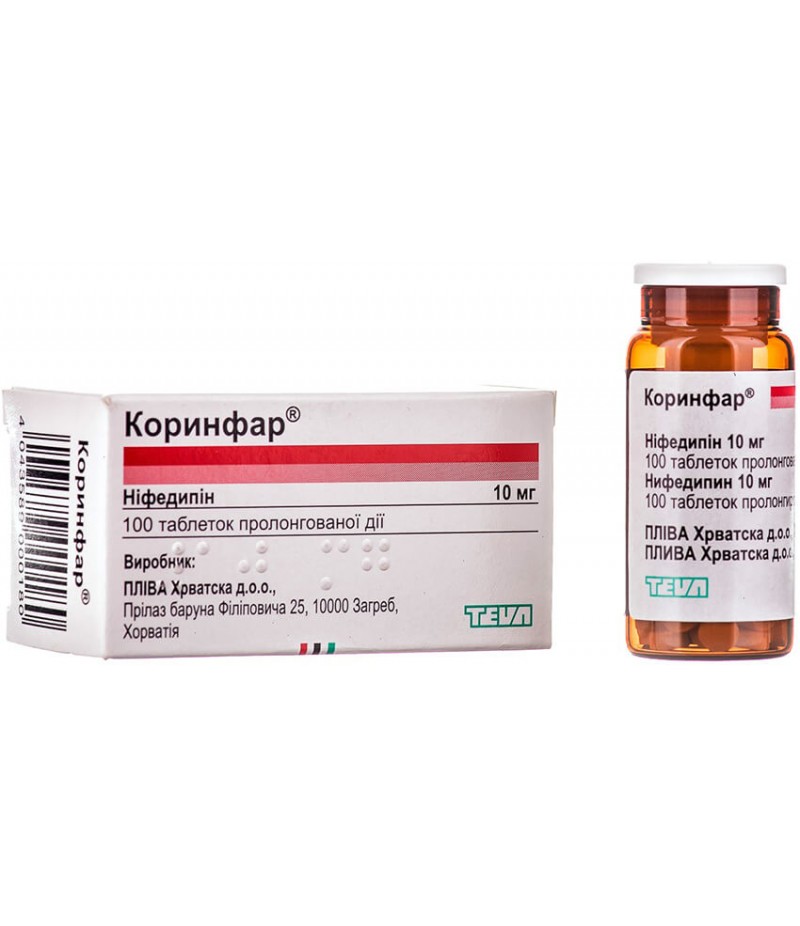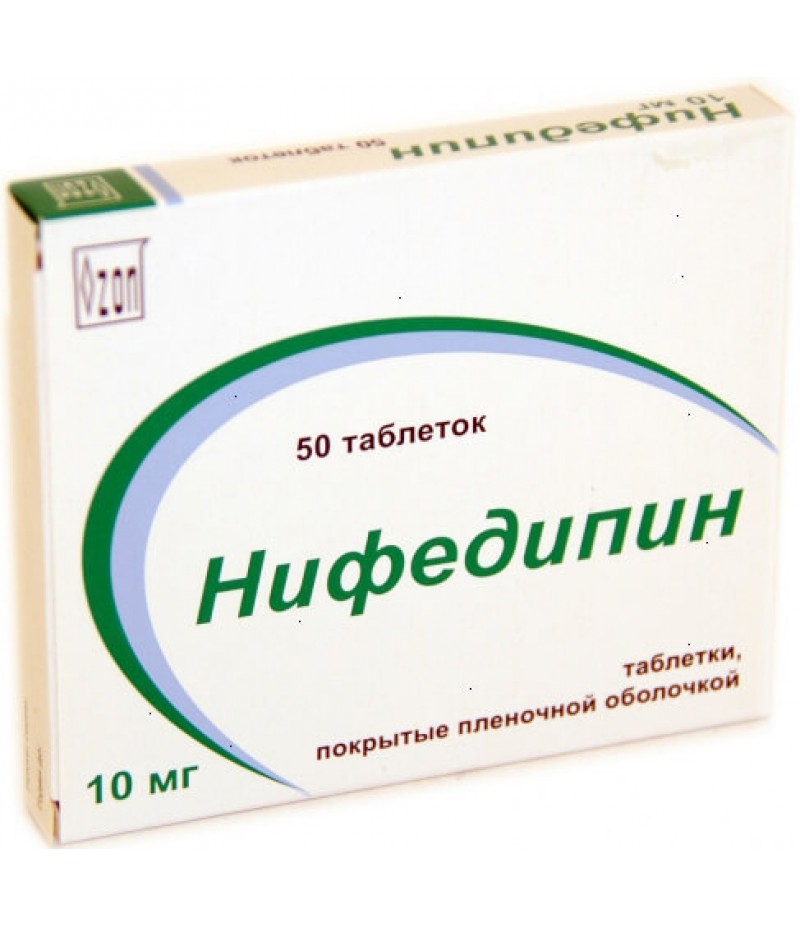Corinfar tabs 10mg #100
- $7.91
- 3 or more $7.79
- Availability:In Stock
Corinfar instructionReed more and buy Corinfar hereTo buy Corinfar in different dosage, just contact usCompositionOne tablet of Corinfar includes: nifedipine - 10 mg; excipients: lactose monohyd..
Tags: tabs
Corinfar instruction
Reed more and buy Corinfar here
To buy Corinfar in different dosage, just contact us
Composition
One tablet of Corinfar includes:
nifedipine - 10 mg;
excipients: lactose monohydrate 15.8 mg, potato starch 15.7 mg, microcrystalline cellulose 15.5 mg, povidone K25 2.7 mg, magnesium stearate 0.3 mg.
The composition of the coating: titanium dioxide - 0.77 mg, macrogol 6000 - 0.48 mg, dye yellow quinoline - 0.27 mg, talc - 0.38 mg, hypromellose - 2.88 mg, macrogol 35000 - 0.22 mg.
One Corinfar Retard tablet includes:
nifedipine - 20 mg;
auxiliary substances: lactose monohydrate - 31.6 mg, potato starch - 31.4 mg, microcrystalline cellulose - 31 mg, K25 of povidone - 5.4 mg, magnesium stearate - 0.6 mg.
The composition of the coating: titanium dioxide - 1.377 mg, hypromellose - 5.188 mg, yellow quinoline dye 0.143 mg, talc -1.038 mg, macrogol 6000 - 0.861 mg, macrogol 35000 - 0.393 mg.
Form of issue
Corinfar and Corinfar Retard are tablets of prolonged action that are covered with a straw-colored shell, biconvex, round, with a bevelled edge; on the cut is a homogeneous substance of yellow color.
10 such tablets Corinfar or Corinfar Retard in blisters, three blisters in a cardboard bundle. Or 50 such tablets Corinfar or Corinfar Retard in a bottle of dark glass, one such bottle in a cardboard bundle. Corinfar is also produced separately by the amount of 100 tablets in a vial of dark glass and a cardboard bundle.
pharmachologic effect
The drug has antihypertensive and antianginal.
Pharmacodynamics and pharmacokinetics
Pharmacodynamics
This drug is a selective blocker (inhibitor) of "slow" calcium channels, chemically refers to dihydropyridine derivatives. The movement of Ca2 + from the intercellular space to the cardiomyocytes and the cage of smooth muscles, peripheral and cardiac arteries is inhibited; at high doses, inhibits the release of Ca2 + from intracellular stores.
In therapeutic doses normalizes the intercellular exchange of Ca2 +, which can be disturbed in a number of pathological conditions (arterial hypertension and others). Does not affect the tone of the veins. Increases coronary blood flow, enhances the blood supply of ischemic areas of the myocardium without the development of the syndrome of "robbery", stimulates the work of collaterals. Expands the peripheral arteries, reduces the overall peripheral resistance of the vessels, myocardial tone, the need of the heart in oxygen. Does not affect atrioventricular and sinoatrial nodes, has a slight antiarrhythmic effect. Also, the drug activates the renal blood flow.
Time the appearance of the clinical effect of bizko to 20 minutes, the duration of the effect is 5-6 hours.
Pharmacokinetics
In the intestine, up to 90% of the drug is absorbed. Bioavailability is about 60%. Eating food increases bioavailability. 95% of the drug binds to plasma proteins. The maximum concentration of nifedipine in the blood of intake of two tablets (20 mg of nifedipine) occurs after 2-3 hours. Completely converted in the liver.
It is allocated by the kidneys in the form of an inert metabolite (70%), with bile (30%). The half-life is about 3-5 hours.
Renal failure, hemodialysis do not change the pharmacokinetics of Corinfar. In people with liver disease, clearance decreases and the half-life period increases. In case of long-term admission (more than two months), tolerance to the drug may develop.
Indications for the use of Corinfar
Indications for the use of Corinfar Retard and indications for the use of Corinfar DNA are the same - the choice of the drug is performed by the attending physician depending on the severity of the disease and individual sensitivity.
Arterial hypertension.
Vasospastic angina pectoris (Prinzmetal angina).
Chronic stress angina.
Contraindications
Allergy to nifedipine and any other dihydropyridine derivatives or components of the drug.
Low blood pressure (systolic pressure less than 90 mm Hg).
Unstable angina.
Cardiogenic shock.
Chronic decompensated cardiac failure, severe aortic stenosis.
The first four weeks of myocardial infarction.
The first 13 weeks of pregnancy.
The period of breastfeeding.
Taking rifampicin.
It is necessary to use with caution the preparation for stenosis of the mitral valve, severe tachycardia or bradycardia, malignant arterial hypertension, syndrome of weakness of the sinus node, hypovolemia, severe disorders of cerebral circulation, myocardial infarction with insufficient left ventricular function, intestinal obstruction, hepatic and renal insufficiency, hemodialysis development of arterial hypotension), 14-40 weeks of gestation, age less than 18 years, joint reception of digoxin, beta-blocker s.
Side effects
On the part of the circulatory system: arrhythmias, tachycardia, peripheral edema, excessive vasodilation (lowering blood pressure, worsening heart failure, flushing of the face, feeling hot), severe depression, fainting. A small number of patients at the beginning of therapy or after increasing the dose may experience angina attacks and in very rare cases - myocardial infarction.
From the nervous system: dizziness, headache, weakness, fatigue, drowsiness. With long-term treatment with the drug in high doses - paresthesia, trembling, extrapyramidal disorders (maskoid face, ataxia, gait change), depression.
On the part of the digestive system: dry mouth, flatulence, dyspepsia, increased appetite. Less often - gingival hyperplasia, disappearing after discontinuation of treatment. With prolonged use - liver damage (cholestasis, increased activity of liver enzymes).
From the musculoskeletal system: myalgia, arthritis, joint swelling, limb spasms.
Hypersensitivity reactions: rarely - hives, itching, autoimmune hepatitis, dermatitis, anaphylaxis.
From the hematopoietic system: leukopenia, anemia, thrombocytopenia, agranulocytosis.
On the part of the excretory system: increased diuresis, impaired renal function (in persons with kidney failure).
Other: rarely - visual impairment, temporary gynecomastia, hyperglycemia, galactorrhea, bronchospasm, weight gain.
Instructions for use Corinfar
Instructions for the application of Corinfar Retard and Corinthus explain how to take this medicine. Tablets are used after meals orally, without cracking and washing with water in sufficient volume. Simultaneous reception with food inhibits the adsorption of the active substance from the intestine. Usually medications are taken in the morning and in the evening, however it is worth remembering that Corinfar OOO 40 mg can be used only once a day.
The dose and multiplicity of the drug intake is selected by the attending physician individually, taking into account the severity of the disease and other clinical aspects.
For vasospastic angina and angina pectoris: 1 tablet of Corinfar Retard or Corinfar (depending on severity and individual sensitivity) 2 times a day. With a mild effect, the dose of the drug is slowly increased to two tablets 2 times a day.
Essential hypertension: 1 table. Corinfar Retard or Corinfar (depending on the degree of severity and individual sensitivity) 2 times a day. With a mild effect, the dose of the drug is slowly increased to two tablets 2 times a day.
With a twice-prescribed drug per day, the interval between doses should be an average of 12 hours. Corinfar is taken at the same time of the day with an interval of 24 hours preferably before lunch, 1 tablet (40 mg) once a day.
Overdose
Symptoms: facial hyperemia, headache, bradycardia / tachycardia, a strong long-term decline in blood pressure, suppression of the sinus node. In severe cases - fainting, coma.
Therapy: symptomatic. As a rule, the stomach is washed, activated charcoal is used. Antidote will be calcium preparations - an intravenous 10% solution of calcium chloride or calcium gluconate. With a strong decrease in blood pressure, slow intravenous administration of dobutamine, dopamine, noradrenaline, or epinephrine is recommended. When there is heart failure - intravenously injected strophanthin. With the development of arrhythmic conditions - isoprenaline, atropine.
Hemodialysis in case of an overdose is ineffective, it is recommended plasmapheresis.
Interaction
The following effects from interaction with the following medicines should be taken into account:
with tricyclic antidepressants, antihypertensive agents, vasodilators - increased hypotensive effect;
with beta-blockers - expressed by a decrease in blood pressure;
with diltiazem - suppression of the metabolism of nifedipine;
with quinidine - a sharp decrease in the concentration of quinidine in the blood, after the withdrawal of nifedipine - a sharp rise in the content of quinidine in the blood;
with digoxin, theophylline - an increase in the content of theophylline and digoxin in the blood (there is a possibility of signs of an overdose of digoxin);
with quinupristin, dalphopistin, cimetidine - an increase in the concentration of nifedipine in the blood;
with rifampicin - acceleration of the metabolism of nifedipine;
with cephalosporins, tacrolimus - an increase in the concentration of the latter in the blood;
with phenytoin - weakening effects of nifedipine;
with drugs that inhibit the cytochrome P450 system (macrolides, fluoxetine, nefazodone, protease inhibitors, antifungal agents) and valproic acid - an increase in the content of nifedipine in the blood;
with carbamazepine, phenobarbital - a decrease in the content of nifedipine in the blood.
Terms of sale
You can buy Corinfar without prescription.
Storage conditions
Store at temperatures up to 30 degrees in the original packaging. Keep away from children.
Shelf life - 5 years.
special instructions
To stop therapy by a preparation it is necessary gradually.
At the beginning of treatment, angina pectoris may occur, especially if there has recently been a sharp abolition of beta-blockers (they also need to be canceled gradually).
In severe heart failure, Corinfar should be dosed with caution.
In individuals with severe obstructive cardiomyopathy, there is a risk of increased frequency, severity, and duration of angina attacks after using nifedipine; in this case, the drug is canceled.
In patients with severe renal failure who are on hemodialysis, have high blood pressure and a reduced volume of circulating blood, the drug is recommended to use with caution, since there is a risk of a sharp drop in blood pressure.
If surgery is planned using general anesthesia, an anesthesiologist should be informed about taking nifedipine.
The drug affects the ability to drive vehicles. Care must be taken when driving.
With alcohol
The drug is not compatible with alcohol.
During pregnancy (and lactation)
The drug has a teratogenic effect, as evidenced by tests conducted on animals.
The 1 trimester of pregnancy is a strict contraindication for taking the drug, and in 2-3 trimesters and during breastfeeding it is necessary to use the drug with great care.
Reviews of Corinfar
Reviews of Corinfar Retard and Corinth, as well as feedback on Corinfar OOE are highly controversial. Along with reports of the excellent effect of using the drug at high pressure, there are testimonials that indicate the lack of therapeutic effect in arterial hypertension, from which the Corinthar tablets should help. This range of opinions is due to the great variability in the sensitivity to the drug among patients (in clinical practice this is a fairly common phenomenon).


